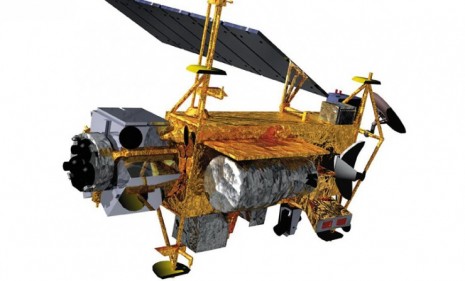NASA's falling satellite: Where will it hit?
When a decommissioned satellite the size of a bus enters the atmosphere in the next few weeks, space agencies worldwide will keep their eyes on the sky

A free daily email with the biggest news stories of the day – and the best features from TheWeek.com
You are now subscribed
Your newsletter sign-up was successful
Sometime in the next few weeks, a six-ton satellite will fall to Earth, and it probably won't hit anyone — or so NASA hopes. The satellite, known as the Upper Atmosphere Research Satellite, or UARS, was put into orbit in 1991 to study atmospheric changes such as the effect of pollutants on the Earth's ozone layer. In 2005, UARS was decommissioned and has been slowly losing altitude ever since. Now that UARS is close to crashing, NASA has no idea where it will hit. Here's what you should know:
How big is the UARS satellite?
Roughly the size of a bus. It's 35 feet long and 15 feet wide — fairly large by space-junk standards. But most of that will burn up as the satellite passes through the Earth's atmosphere. Still, roughly 26 separate pieces are expected to remain intact, with a combined weight of about 1,100 pounds. The largest chunk could be the satellite's main body, weighing about 330 pounds — roughly the weight of a large refrigerator.
The Week
Escape your echo chamber. Get the facts behind the news, plus analysis from multiple perspectives.

Sign up for The Week's Free Newsletters
From our morning news briefing to a weekly Good News Newsletter, get the best of The Week delivered directly to your inbox.
From our morning news briefing to a weekly Good News Newsletter, get the best of The Week delivered directly to your inbox.
What's the likelihood that it will hit someone?
Slim. NASA estimates there's a 1-in-3,200 chance that any piece of UARS will strike a person. Most of the time, space debris falls on unpopulated land or into the ocean, since more than two-thirds of the Earth's surface is ocean. "Things have been re-entering ever since the dawn of the Space Age; to date nobody has been injured by anything that's re-entered," says NASA official Gene Stansbery, as quoted by SkyNews.
Is NASA always so careless about space junk?
Not anymore, since space junk has become an increasing concern among the world's space agencies. Current standards require that a retired satellite have enough reserve fuel to put it into a "graveyard" orbit, or that it be brought down to Earth in a controlled manner. But when UARS was commissioned two decades ago, those standards weren't in place.
A free daily email with the biggest news stories of the day – and the best features from TheWeek.com
-
 Antonia Romeo and Whitehall’s women problem
Antonia Romeo and Whitehall’s women problemThe Explainer Before her appointment as cabinet secretary, commentators said hostile briefings and vetting concerns were evidence of ‘sexist, misogynistic culture’ in No. 10
-
 Local elections 2026: where are they and who is expected to win?
Local elections 2026: where are they and who is expected to win?The Explainer Labour is braced for heavy losses and U-turn on postponing some council elections hasn’t helped the party’s prospects
-
 6 of the world’s most accessible destinations
6 of the world’s most accessible destinationsThe Week Recommends Experience all of Berlin, Singapore and Sydney